It happened again. Two good conversations with pastors and another with a leader in a para-church organization. Good leaders, sharp thinkers, energetic voices for a good and beautiful vision of the Kingdom of God. Each in their own way expressed serious concerns about not just their energy level (down) and stress levels (up) but their mental and spiritual health. One said he was re-reading Steve Garber’s Visions of Vocation: Common Grace for the Common Good for an eloquent and rich reminder of the weight many of us carry and how to somehow learn to love as God loves, knowing what we know about the deep brokenness of the world.
Whether it is the demoralizing daily grind of slogging through paperwork and bureaucracy or carrying the weight of hurting friends or lamenting the grave injustices of our fallen world, any caring Christian is sure to have seasons of frustration. For some pastors and leaders, these frustrations and aches are becoming worse and acute. As we’ve heard from many news stories telling about more and more research and reports, we are facing — especially in the faith communities — a crisis among leaders.
We’ve got four great new books that can help leaders and pastors and we think that they could be helpful. Maybe if you are a leader, you should make time for these. Maybe start a collegial study group with colleagues who would understand the benefit of chatting about these kinds of resources. If you are not in professional ministry yourself, it is very likely that you care for someone who is. Why not gift them with one or two of these? You know we love to tuck in nice little notes when we send books as gifts. Can we help you do that?
And then, after the four new ones, I tag on a couple recent ones that I’ve mentioned before because it seemed wise and good to remind readers of those as well. All, of course, are 20% off.
Each of these books deserves a more thorough review. I don’t have my best critical chops out today and I’m not going to wax long about them, as much as I wish I could and as much as they deserve the best accolades. “Time’s a-wasting” as my dad used to say. Let’s get to it.
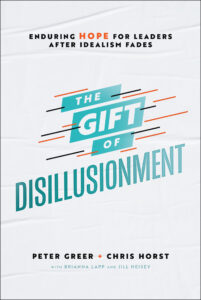 The Gift of Disillusionment : Enduring Hope for Leaders After Idealism Fades Peter Greer & Chris Horst (Bethany House) $22.99 OUR SALE PRICE = $18.39
The Gift of Disillusionment : Enduring Hope for Leaders After Idealism Fades Peter Greer & Chris Horst (Bethany House) $22.99 OUR SALE PRICE = $18.39
I know both of these authors and respect them immensely. Both are lively and thoughtful young men moving, soon enough, I gather, into their mid-life years. Peter is the President and CEO and Chris a chief advancement director for Hope International, a very impressive Christian organization that offers mici-financing loans and helps set up savings collectives and alternative banks throughout the two-thirds world. From East Asia to central Africa to South America to Eastern Europe — yes, they have team members working in Ukraine —they serve the poor with structural assistance and systemic reforms that enable ordinary folks to thrive and flourish. We really respect them a lot.
Peter has travelled the world overseeing these life-changing financial innovations and also has this vocation of being a writer; he’s done books on leadership, on “mission drift”, and on mid-life issues for faith leaders. He and Chris have collaborated before, even on a striking one called Rooting for Rivals which is about collaboration and generosity between “rival” organizations. Pretty idealistic.
What happens when such idealism fades? How do energetic leaders cope when disappointment hits, when burn-out approaches? When discouragement erodes not just the joy of the leader but when it erodes the vitality of organizations? “Visionaries often succumb to cynicism,” they note, and “zealous advocates give up. Leaders coast as their passion for the cause grows cold.”
The Gift of Disillusionment is a book found very inspiring and I found myself exclaiming on what a page-turner it was. That says something about my own crisis of these sorts, I’m sure, but I’ve read any number of books that have not been particularly interesting, let alone helpful. This one hit the spot.
The book includes good psychological and organizational insights and is grounded in a mature Christian perspective. Not only is there good teaching and much hard-earned wisdom from these two leaders, two others — Brianna Lapp and Jill Heisey — have helped them process research and interviews they did, telling the stories of key leaders from around the world who found their sweet spot again, so to speak, after significant discouragement.
The first few chapters are really good as they explore what they call false hope, faint hope, and forgotten hope. Then they process with us the stories from remarkable folks and arrange them around themes or units called upward, outward, and onward. Finding hope, according to research they’ve done and the stories they’ve heard, is not simple nor is it merely a matter of buckling down or just trusting God more. We need to remember some stuff about spiritual formation, about ordering our loves and desires, about community, about faithful endurance and hopeful perseverance. These fascinating stories will inspire any reader — especially if you get energized by hearing about good global projects doing innovative work for justice — and the testimonies of the leaders who share about their own journeys through disillusionment will help anyone who feels their own hope waning, Highly recommended.
This wise and beautiful book draws on insights from Christ-followers with decades in the trenches of a mystery: the strange place where we know it’s God’s job to save the world, and yet we are called to be His instruments. Greer and Horst reveal how this is the place where the gift of disillusionment awaits; the gift that strips away self-confidence and pivots our gaze upward so we can find the courage to keep moving forward. I was deeply encouraged by these saints’ steadfast reliance on King Jesus and the persevering joy that emerged from that. Highly recommended for all those needing a fresh injection of realistic, informed, God-centered hope that can shrink the shadows cast by brokenness and suffering. — Amy L. Sherman, author of Agents of Flourishing: Pursuing Shalom in Every Corner of Society
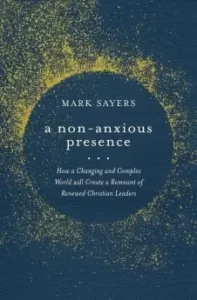 A Non-Anxious Presence: How a Changing and Complex World Will Create a Remnant Renewed Christian Leaders Mark Sayers (Moody Press) $15.99 OUR SALE PRICE = $12.79
A Non-Anxious Presence: How a Changing and Complex World Will Create a Remnant Renewed Christian Leaders Mark Sayers (Moody Press) $15.99 OUR SALE PRICE = $12.79
I love this author and recommend all of his previous popularizations of remarkable social scientists and thought leaders. Sayers is a thinker and speaker (and Aussie pastor) who has a seemingly endless capacity for reading philosophy and cultural studies and applying those formative thinkers and critics to the life of the church. He may not have a penchant for witticisms like the formidable futurist Len Sweet or the case-study storytelling of the great Tom Sine but he’s in that league, if a bit more hip, offering updates on the signs of the times and showing how God’s Kingdom might advance by appreciating the keenest cultural observers and applying Christian thinking to their forecasting.
From books like Strange Days to his excellent (if brief) leadership volume Facing Leviathan, Sayers is an author you should know. (I still rave about his first, a study of postmodern consumerism called The Trouble with Paris and his clever study of the implications of Jack Kerouac called The Road Trip That Changed the World.) Perhaps you know him from his popular podcast “This Cultural Moment” co-hosted with John Mark Comer.
Having said that, it might be helpful to know that this is not a warmed over introduction to family systems thinking or the enduring work of Rabbi/counselor Edwin Freidman, even though he cites A Failure Nerve: Leadership in the Age of the Quick Fix.
I don’t know if Sayers is right all the time, as when he says, here, that, “crisis always precedes renewal.” (See his brief and fiesty Disappearing Church and Reappearing Church for more of that especially applied to congregations.) But as it says on the back cover,
For much of recent history individuals and institutions could plan, execute, and flourish with their visions of a better world. Volatile, complex forces could be addressed and confronted with planning and management. But, crisis is a great revealer. It knocks us off our thrones. It uncovers the weaknesses in our strategies and brings to light our myths and idols. Our past strategies run aground, smashed by unpredictable and chaotic waves. Yet in the midst of the chaos of a crisis comes opportunity.
This can be a quick read with its bullet point summaries and highlighted “takeaways.” But don’t let the little diagrams and chapter reviews fool you. This is big-picture stuff that will drive serious leaders to rely on, as Sayers putsit, “the Presence amidst the pressures.” As he remind us, the power of God’s Kingdom sometimes best emerges in the wilderness.
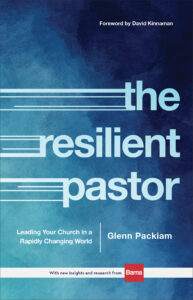 The Resilient Pastor: Leading Your Church in a Rapidly Changing World Glenn Packiam (Baker Books) $22.99 OUR SALE PRICE = $18.39
The Resilient Pastor: Leading Your Church in a Rapidly Changing World Glenn Packiam (Baker Books) $22.99 OUR SALE PRICE = $18.39
When Rich Villodas (of The Deeply Formed Life and the forthcoming Good and Beautiful and Kind) recommends a book and when Skye Jethani says it is “required reading” I take notice.
Listen to Pastor Villodas:
It’s not hyperbole to say that this moment in history is one of the most difficult times to be a pastor. Ever. Yet, this moment has given us the opportunity to reimagine pastoral ministry for a new generation. This book could not have come at a better time.
I picked this up after a quick skim, wanting to read just a bit more and I found myself captivated, wiping away tears, re-reading parts, exclaiming to Beth how I knew pastors and ministry leaders who needed this book. And I sure wished, I said throughout, that church-members who are not clergy would also read this to get a glimpse into the data and stories of what embattled and discouraged pastors are going through these days. I’m not a pastor, of course, but I know the exhaustion some pastors face.
While The Resilient Pastor is based on fascinating and helpful research done by The Barna Group and is at first about how to build resiliency among discouraged pastors (the first step, by the way, is embracing, perhaps with the help of Eugene Peterson who helped Packiam considerably, the very notion of pastoring which, as the data shows, has fallen on hard times) there is plenty in here about the nature of beleaguered churches and insights about how to think about church in fresh and faithful ways. Which is to say the book is not just for the reverends.
The Barna research is presented clearly and colorfully in blue ink, with a few extra design touches giving the book a very attractive look and feel in the hand. (Thanks for the swirly blue endpapers, guys! Very impressive in this day of rising manufacturing costs.) Baker has partnered with Barna before and this trademark look is not just pleasing to the eye but communicates the data well. And the data they’ve unearthed really is worth knowing.
The Resilient Pastor is part narrative; Packiam has a fabulous story having come to faith in his homeland in Malaysia and having been a music guy/contemporary worship leader before earning a PhD at Durham and those transformative three days with Eugene and Jan Peterson in their Montana home. Packiam’s doctoral work, by the way, seems to have been about the interface of contemporary worship an older, classic liturgies — it isn’t every CCM recording artist who quotes Saint Cuthbert and has been to Lindisfarne, who tells of his visceral reaction reading Under the Unpredictable Plant, and who has navigated pastoring well an urban campus of a US megachurch. From Barna Prez David Kinnaman’s introduction, we hear of how he and his team wanted Glen to author the book around the ongoing research they were doing in pastoral integrity and resilience, and from chapter one we hear Glen’s telling of the invite from Kinnaman, back before Covid. I was moved by the whole set-up, I really was.
I like that Packiam reviews the big picture stuff of our changing context — by which I mean the cross pressures of our “God-haunted” post-Christian culture as described by Charles Taylor and his interpreters such as James K.A. Smith or Andrew Root. As a person of color, Packiam knows something about the complexity of the American church and the “color of compromise”, too, even though he is not foregrounding that. He knows that in our “secular age” the credibility of religious leaders is no longer assumed and that the very vocation (and notions of calling) of pastors is in the wind. He gets the cultural context these days and helps pastors and those who care about the church understand.
In good prose surrounding fabulously important data and research tidbits, Packiam offers four main challenges for pastors, dealing with the meaning and stresses of calling, spirituality, relationships, and credibility. After each chapter there is a several page entry of original insight from other voices as well, good folks such as Ruth Haley Barton, Marlena Graves, and Tara Beth Leach. Ruminating on the section on vocation, Ken Shigematsu tells just a bit about his pastoring context:
When I first came to Tenth Church in Vancouver, BC, in the summer of 1996, the challenge of pastoring a historic church whose attendance had dwindled from over one thousand to one thunder and something intimidated me. Tenth had cycled through twenty pastors in twenty years…
In part two of The Resident Pastor, Packiam explores four challenges facing the church and, again, explains the Barna research findings about these four topics. These are, likewise, combined with short sidebar testimonials of other leaders (from Bishop Todd Hunter to Dr. Derwin Gray to global activist Christine Caine.) The challenges the church must entertain that he ponders include matters of worship, formation, unity, and mission. Again, while oriented towards church leaders, this is up-to-date stuff that any active congregant should be thinking about. I cannot recommend this book enough for its clarity, concise style, even as Packiam is a warm and endearing writer. Did I mention I had to fight back tears?
Part three is brief (just two chapters) but they, again, are packed with insight and inspiration for pastors, leaders, and congregants. Those closing portions are on “The Collaborative Church” and “The Presence and the Power.” You can imagine the content and I can assure you they are worth reading.
Packiam is a spiritually lively evangelical at a megachurch. Yet, I think that any mainline devotee or small church reader will be impressed with his down-to-Earth sense and the remarkable convergence of the data with what some of our best thinkers have been saying over the last decades. From Eugene Peterson to Jamie Smith to Alan Kreider to N.T. Wright, Packiam and his co-writers, women and men from various settings and dispositions, agree that pastoring is hard, that the church has some serious re-thinking to do, and that now in this Covid-era is the time to urgently consider how companions in faith can help us along the journey. Time and again, Packiam shows himself not as a self-proclaimed expert (or a social forecaster making predictions about the future) but a friendly colleague. You dear reader — especially if you are a pastor or leader who feels rather alone — are not alone. Even if you are feeling the fray.
“It is possible,” Glen reminds us, “to last, to be faithful, to be resilient — not by might, not by power, but by the same Holy Spirit who sustained the church throughout the centuries.”
You can “steward your season” as he puts it, even if you are discouraged or exhausted. “You don’t have to make your mark or leave a legacy. No labor in the Lord is ever in vain. Jesus Christ is risen from the dead.”
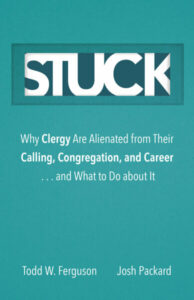 Stuck: Why Clergy Are Alienated from Their Calling, Congregation, and Career… and What to Do About It Todd W. Ferguson & Josh Packard (Fortress Press) $22.99 OUR SALE PRICE = $18.39
Stuck: Why Clergy Are Alienated from Their Calling, Congregation, and Career… and What to Do About It Todd W. Ferguson & Josh Packard (Fortress Press) $22.99 OUR SALE PRICE = $18.39
Wow, what a book this is. While Stuck may not be written with the same evangelical zeal or hopeful warmth of Resilient Pastor by Glen Packiam, it does offer some remarkable insight and amazing stories by the research these two authors did around the themes of the job dissatisfaction and alienation many religious leaders feel. There is some overlap, naturally, but Stuck is in some ways a deeper dive into the topic, authored in a caring and understanding way, but, significantly, by two professional sociologists. And while Pastor Packiam explores the secularizing age in light of, say, Charles Taylor and the missional vision of an engaged church (informed by good thinkers from Leslie Newbigin to Andrew Root) Ferguson & Packard are clear that their shaping influences (for this project, at least) are less theologians and more the likes of Max Weber, C. Wright Mills and, yep, good golly Miss Molly, good old Karl Marx. The book is about why clergy are alienated from their labor, so, well, they go there. And it rings very, very true.
This is an utterly fascinating book, even if drawing on scholars of sociology and the best researchers (of a mainline denominational bent) of congregational life such as Nancy Ammerman, Mark Chaves, and the under appreciated magisterial work by Arlie Russell Hochschild, The Managed Heart: Commercialization ofHuman Feeling published by the University of California Press all sounds a bit dusty. It mostly isn’t dry and at some points is exceedingly poignant. Besides hearing so many excerpts of so many interviews with disillusioned pastors, there is plenty of the big picture stuff. They even pull up the old chestnut Why Conservative Churches Are Growing: A Study in the Sociology of Religion by Dean Kelly, published in 1972.
But there are forces at play here that are more recent, as well, and they explore with great vigor this new understanding of the social forces that shape modern ministry. And, yes, their Marxian insights about the “means of production” and worker’s alienation is an interpretive lens that is generative. If you have ever had a conversation with a pastor who is unhappy in his or her assigned church but cannot leave, perhaps for financial reasons, you know what I mean. If you’ve had the heartbreaking discussion with a leader who does not believe what their church or mission agency expects them to and they can’t be honest because they will lose their needed health insurance for, oh, say, their sick child, well, you can imagine. In the real world of complicated institutions and denominations, clergy really often do feel stuck.
Listen to Sharon Hodde Miller of Bright City Church in Durham, as one leader who bears witness to the importance of this study; she says:
I have never felt so understood. I am deeply grateful for the insights contained in these pages, which were personally illuminating and filled me with hope.
Here is how the publisher describes the benefits of this striking book:
Stuck is a guide for understanding how and why a traditional approach to ministry does not align with the modern realities facing pastors, congregations, and seminaries. More than simply describing findings from their firsthand research, however, Todd W. Ferguson and Josh Packard offer a new understanding of why professional ministry can be so alienating today.
Stuck shifts the dominant narrative around calling, vocation, and ministry away from a focus on individual traits and characteristics of pastors and congregational leaders and toward a more structural understanding of the social forces that impact modern ministry. The authors focus on the nature of calling; the need for modern, flexible congregational supports; and a different approach to training professional clergy.
Stuck lets pastors who feel stuck know that they’re not alone, they’re not crazy, and it’s not their fault. It helps congregations be more supportive of their clergy. And it participates in the conversation for reshaping seminary training and professional development.
There are two chapters in each of three sections, the sections exploring themes of being “Stuck in Calling”, “Stuck in the Congregation,” and “Stuck in the Career.” Ferguson and Packard report on the stories and statistics about pastors who have doubted their callings, the expectations pastors have going into their callings contrasted to the reality of the duties and workload of most pastors, the way in which the business side of things impinges on fulfilling ministry, and how ill-prepared many pastors are for the mundane work that takes up most of their time.
Naturally, one of the good chapters is on one question that comes to mind — “Why Don’t They Just Leave the Ministry?” Another is provocatively called “Leaving the Ministry to Follow the Call.” You should read it and wonder…
(For what it is worth, one of the facts on the ground — or in the carpeted sanctuary, I might say — is that there is not a huge about of faith deconstruction happening among hurting clergy. In both the Barna research and the studies done by Ferguson & Packard, there are those who may feel in exile from their religious institutions and some who may have to “leave the ministry in order to follow their call” but this isn’t so much a faith crisis or spiritual disillusionment but a wearing down of the pastor, an eroding of their zeal by the culture of the church and denomination and institutions they serve.
I very much appreciate the United Methodist scholar and leader and writer, L. Gregory Jones (now at Belmont University, but previously at Duke) who insists that this alienation of clergy from their callings is a crisis for all of us. Jones says it “cries out for the kind of urgent attention and action reflected in Ferguson and Packard’s analysis.” And endorsement from him means a lot.
Stuck: Why Clergy Are Alienated from Their Calling, Congregation, and Career… and What to Do About It by Ferguson & Packard is a book I’ve been thinking about for days and days since I read it. I hope to talk to church folks and pastors about it. It would certainly be interesting to bring The Resilient Pastor and Stuck into conversation as they are both driven by a deep love for pastors, and realization of the complexity of their jobs and the burn-out many are facing and what the nature of ministry these days seems to entail.
Todd W. Ferguson is a sociologist whose research focuses on congregations and their clergy. He earned his Ph.D. from Baylor University and a Master of Divinity from Duke Divinity School. Josh Packard is the Executive Director of Springtide Research Institute and professor of sociology at the University of Northern Colorado. Their good work is obviously committed to offering fresh ways to think about church, clergy health, and their sense of calling and vocation.
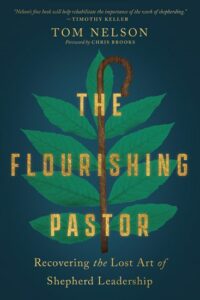 The Flourishing Pastor: Recovering the Lost Art of Shepherd Leadership Tom Nelson (IVP) $18.00 OUR SALE PRICE = $14.40
The Flourishing Pastor: Recovering the Lost Art of Shepherd Leadership Tom Nelson (IVP) $18.00 OUR SALE PRICE = $14.40
Here is how the publisher reminds us of the urgency of this book:
With the risk of burnout at an all-time high, pastors need a new framework for ministry that will help them move from survival to flourishing. Drawing on the image of the shepherd leader, Tom Nelson offers pastors wisdom and timely vision for leadership that integrates in-depth biblical teaching and whole-life discipleship, providing a roadmap for ministry resilience and longevity.
When I awarded this as one of the Best Books of 2021, here is what I wrote about it. Thought it would be helpful to share it again, here, with these other stellar titles.
We have a lot of books about the vocation of being a pastor, the meaning of the role of the clergy, being a minister or priest. I read a good number of them, thinking of the men and women who I know who serve often under difficult conditions in the local church. I suppose you know the data showing how unhappy many, many clergy are, and I know you know the reports that in the last years, more and more have walked away from the calling and their churches. In many cases, it was a healthy thing to do. I do wish more read more books about the qualities of a good pastor and the characteristics of those that flourish. There’s a lot of good ones from many different angles.
For several reasons, it is my judgement that this is one of the very best books of this kind quite some time. I admire Tom, and I so respect his big picture of the Kingdom of God, networking church leaders for making a difference in the community. His “Made to Flourish” organization emerged out of his passion for thinking about work, Christianly, and realizing that much good that happens outside of the church doors as congregants are encouraged to relate Sunday worship to Monday work, so to speak.
Given that this is his expertise, helping people reflect on calling and career, vocation and work, what, then, might this have to say to those whose job is to be a minister, a preacher, a leader of the local Body? The Flourishing Pastor really is wise and emerges not only from Tom’s acute insight into the Bible and the theology of the shepherd leader, but also from his passion for thinking about sustainable and meaningful work stewarding our callings well.
Here are just three of the many positive recommendations by people we trust:
Traditionally there are three parts to the ordained ministry―preaching, pastoring, and leading. In our religious world today, preaching and leading are the most highly valued. But while it is not so visible and attention grabbing, skillful knowledge of and pastoring of the human soul is perhaps the most fundamental of the three. Talented preachers and leaders who are not mature and wise pastors may draw a crowd, but they will not help believers ‘grow in grace’ (2 Peter 3:18) and Christlikeness in both their private and public lives. Tom Nelson’s fine book will help rehabilitate the importance of the work of shepherding in our churches — Timothy Keller, Redeemer City to City
The Flourishing Pastor overflows with practical wisdom from the frontlines of a pastoral ministry that has been both faithful and innovative. Tom Nelson understands the contemporary cultural challenges of pastoral ministry as well as its timeless woes, from the discouragement of grumpy parishioners to the heady lure of celebrity and the loneliness of leadership. This book makes clear the irreducible foundation of the ministerial vocation: intimacy with God that roots one for integrity and resilience over time. Simultaneously, it coaches pastors in a vital, practical skill: discipling congregants in connecting their work and worship. While unpacking it all, Nelson writes with a pastor’s heart, and it’s easy to see why he has been a beloved mentor to many a young pastor. — Amy L. Sherman, author of Kingdom Calling: Vocational Stewardship for the Common Good and Agents of Flourishing: Pursuing Shalom in Every Corner of Society
It is no secret that pastoral ministry is in crisis. And into that crisis Tom Nelson has unflinchingly walked with humility and authority to provide just what our weary shepherds need―restoration and guidance: restoration that is deep and comprehensive; guidance that is wise and convicting. Grounded and beautiful, The Flourishing Pastor brings necessary healing and hope not only to pastors but also to those of us in their care. — Curt Thompson, author of Anatomy of the Soul, The Soul of Shame, and The Soul of Desire
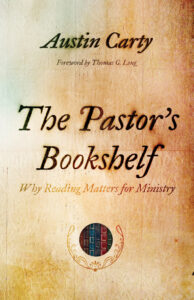 The Pastor’s Bookshelf: Why Reading Matters for Ministry Austin Carty (Eerdmans) $19.99 OUR SALE PRICE = $15.99
The Pastor’s Bookshelf: Why Reading Matters for Ministry Austin Carty (Eerdmans) $19.99 OUR SALE PRICE = $15.99
When this book came out month ago I listed it with some other titles about books and reading (such as, for instance, the Square Halo title Wild Things and Castles in the Sky: A Guide to Choosing the Best Books for Children edited by Leslie Bustard, Carey Bustard & Thea Rosenburg ($29.99; OUR SALE PRICE = $23.99.) Anybody who really loves books and wants to nurture the reading life, I figured, would so appreciate Carty’s tribute to the role of books in one’s spiritual life. As I said, even though it is for pastors, I think most of our bookish customers would love it — or might want their pastor to have it. It fit perfectly I that list about books about books.
Yet, here we are in a list of books about clergy and pastors and Christian leaders. And this, really, is where this book most obviously belongs. And it is urgent that I list it here. Reading The Pastor’s Bookshelf is a veritable therapy session with a pastoral counselor, a conversation partner with a ministry leader, it is a good long drink with a trusted fellow colleague, guiding you to life-sustaining, ministry enhancing, soul-deepening resources.
Here is more or less what I wrote about it before, happily shared again in this list for tired pastors. I’m convinced that The Pastor’s Bookshelf and the habits it will inspire and the particular resources it will recommend, could be the best twenty bucks you’ll spend all year.
I wish I had time here to tell you more, but I can at least share a few of the topics in the three main sections.
- “All The Reading We Don’t Remember” looks at reading for formation, on developing wisdom, how books can help us learn to love. Clearly, we read not just for “information but for formation.”
- “Not Just a Luxury” is a section with chapters on reading for pastoral care, for preaching, for vision casting, for leadership.
- “For Whatever Reason” is a unit of chapters on reading “as” a pastoral visit, a spiritual discipline, and good pieces on reading with a proper spirit, choosing what to read, marking and filing our reading, and the like.
As he explains, six months into his first senior pastorate, Austin Carty sat in his office reading—not the Bible, not a commentary, not a theological tract, but a novel by Fyodor Dostoevsky. As the minutes turned to hours, while he sat engrossed in this book, he noticed something: he began feeling uneasy. And then anxious. And then guilty. What would someone think if they opened the door and caught him reading fiction?
You may recall some of the explicit teaching about this by Eugene Peterson. Or even the very inspiring book by Cornelius Plantinga called Reading for Preaching: The Preacher in Conversation with Storytellers, Biographers, Poets, and Journalists (which I also recommend widely, even, again, to those who are not preachers.) This new one by Carty, The Pastor’s Bookshelf, is in that great company. Solidly so, even if Carty is the sort of guy who was once — yep, it’s really wildly true! — a reality TV star on the show Survivor.
There is a fabulous forward by Rev. Thomas Long, in which he says: “One remarkable feature of Carty’s writing in this volume is how much of it is done in conversation with others, particularly parishioners and others who are on the receiving end of ministry. Carty hopes to encourage pastors who read, but not merely as a form of gratuitous self-improvement, but reading done among, with, and for the people of God.” Nice, eh? Perfect for anyone interested in books, reading, and conversations stimulated by the printed page. But especially for pastors who need to renew or deepen their own interior resources to face the complexities of doing ministry these days.
Check out these other great endorsements:
Christians are a people of the Word, yet we are formed more and more today by wanton, careless words. Those who will lead the church well will be those who are formed by good words—those who know the power words have over our hearts and minds. Those who read good books well will be such leaders. Pastors who read and live by the wisdom in this book will be changed, as will their ministries and the people to whom they minister. This book belongs on every pastor’s shelf. — Karen Swallow Prior, author of On Reading Well: Finding the Good Life through Great Books
Reading is crucial for ministry, not as a mine for anecdotes and illustrations, but as an apprenticeship of the imagination. In this warm and wise book, Austin Carty invites pastors to develop capacious reading habits, as wide and curious and wonderful as the world in which they serve. I hope this book is an occasion for many pastors to build new shelves of poetry and fiction, biography and memoir, all of them adventures in understanding humanity. — James K. A. Smith editor in chief of Image journal, author of You Are What You Love
I am gobsmacked by this book’s threefold beauty: its writing, its erudition, and the author’s deep commitment to what true reading can give not only pastors, but us all.
— Maryanne Wolf, author of Reader, Come Home: The Reading Brain in a Digital World
 The Great Belonging: How Loneliness Leads Us To Each Other Charlotte Donlon (Broadleaf Books) $16.99 OUR SALE PRICE = $13.59
The Great Belonging: How Loneliness Leads Us To Each Other Charlotte Donlon (Broadleaf Books) $16.99 OUR SALE PRICE = $13.59
This is another book that I had previously announced that I thought I’d mention again in this list for the tired or disillusioned among us. Although it is not written for clergy and there is nothing precisely for pastors here, it is such a good and vital book, about a topic that, obviously relates to the questions of professional burnout or being “stuck” and alienated, that I wanted to give it a quick shout out again, here.
Let’s face it, if we are, as the lovely and helpful work by Glen Packiam, above, puts it, seeking resilience, then having some tools and resources and practice for “transforming loneliness into true belonging” could be helpful.
Other titles lately have reminded us, loneliness is nearly epidemic. As the back cover of The Great Belonging puts it, “In an age of mobility and fraying civic life, we are all susceptible to its power.” Even those who work in faith communities? Maybe especially those who get to talk about community for a living? Could it be…
Charlotte Dolon is an energetic and interesting writer. (That Lauren Winner was an editor and wrote the forward gives an early clue that this is going to be a very good book.) She hosts the “Hope for the Lonely” podcast and has written for The Washington Post, Millions, and the always fascinating Mockingbird. Indeed, David Zahl, the director of Mockingbird Ministries and author of the brilliant Secularity, has a blurb on the back, again, giving us a hint that the book is full of grace and seriously human. Zahl writes,
Charlotte Donlon covers her twin subjects of isolation and alienation in ways that help the reader not only get through them but hold them and learn from them graciously. Somehow both timely and timeless — highly recommended.
I really like this book and find in Zahl’s comment an insight about it — Ms Donlon isn’t just teaching us to cope with our loneliness (or to, well, you know, just get some friends for Pete’s sake.) No, her ruminations give voice to our own pain and thereby offer us a way to “hold” it. “Linger and listen”, she says. She reframes our loneliness and restlessness — I think of Jamie Smith’s good work on Augustine in his On the Road with Saint Augustine, for instance — and shows how our disquiet within might be a key, or perhaps a doorway, to greater belonging. What she poetically terms the Great Belonging.
These short enjoyable reflections tell stories and give examples of belonging to our own selves; belonging to each other; belonging to God, and how we can enter that Great Belonging even through the arts and literature. It’s the sort of short but profound read that anyone can enjoy. I commend it here, now, to leaders of the disillusioned sort, to burned out pastors, to those who are stuck. This beautiful little book — that Marlena Graves has called, rightly, “brooding” — may be just what the doctor ordered as one part of your journey to resilience and health. Enjoy.
TO PLACE AN ORDER
PLEASE READ THESE REMINDERS AND THEN CLICK ON THE “ORDER” LINK BELOW.
It is helpful if you would tell us how you prefer us to ship your orders. The weight and destination of your package varies but you can use this as a general guide.
There are generally two kinds of US Mail options, and, of course, UPS. If necessary, we can do overnight and other expedited methods, too. Just ask.
- United States Postal Service has the option called “Media Mail” which is cheapest but can be slow. For one typical book, usually, it’s about $3.50.
- United States Postal Service has another option called “Priority Mail” which is $8.35 if it fits in a flat rate envelope. Many children’s books and some Bibles are oversized so that might take the next size up which is $8.95. “Priority Mail” gets much more attention than does “Media Mail” and is often just a few days to anywhere in the US.
- UPS Ground is reliable but varies by weight and distance and may take longer than USPS. We’re happy to figure out your options for you once we know what you want.
– DON’T FORGET TO LET US KNOW WHAT SHIPPING METHOD YOU PREFER –
BookNotes
SPECIAL
DISCOUNT
20% OFF
ALL BOOKS MENTIONED
+++
order here
this takes you to the secure Hearts & Minds order form page
just tell us what you want to order
inquire here
if you have questions or need more information
just ask us what you want to know
Hearts & Minds 234 East Main Street Dallastown PA 17313
read@heartsandmindsbooks.com
717-246-3333
It is complicated for us, but we are still closed for in-store browsing due to our commitment to public health (not to mention the safety of our staff and customers.) The vaccination rate here in York County is sadly lower than average and the new variant is now spreading badly. Our store is a bit cramped without top-notch ventilation so we are trying to be wise and faithful.
Please, wherever you are, do your best to be sensitive to those who are most at risk. Many of our friends, neighbors, co-workers, congregants, and family members may need to be protected since more than half of Americans (it seems) have medical reasons to worry about longer hazards from even seemingly mild Covid infections. The data about the implications of “long Covid” concerns us.
We are happily doing our famous curb-side customer service and can show any number of items to you if you call us from our back parking lot. We are eager to serve and very grateful for your patience as we all work to mitigate the pandemic.
Of course, we’re happy to ship books anywhere. Just tell us how you want them sent.
We are here 10:00 – 6:00 EST / Monday – Saturday, closed on Sunday.

